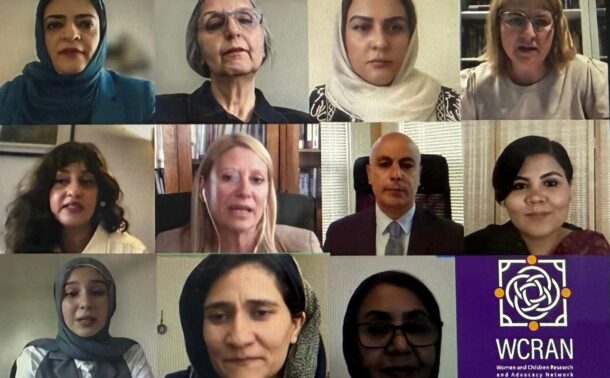The Consequences of the Education Ban on School Girls in Afghanistan
 WCRAN hosted a virtual event on September 17, 2025, titled “The Consequences of the Education Ban on School Girls in Afghanistan,” marking the fourth anniversary of imposed restrictions on girls’ education in Afghanistan. This event aimed to disseminate WCRAN’s new case studies findings documenting the consequences of the ban on school girls and their families and discuss potential effective approaches for supporting girls’ education and reducing the negative impacts of the ban. The webinar featured powerful testimonies from Afghanistan schoolgirls, expert analysis, and urgent policy recommendations, rallying global action to restore education rights for millions of girls denied schooling under Taliban rule.
WCRAN hosted a virtual event on September 17, 2025, titled “The Consequences of the Education Ban on School Girls in Afghanistan,” marking the fourth anniversary of imposed restrictions on girls’ education in Afghanistan. This event aimed to disseminate WCRAN’s new case studies findings documenting the consequences of the ban on school girls and their families and discuss potential effective approaches for supporting girls’ education and reducing the negative impacts of the ban. The webinar featured powerful testimonies from Afghanistan schoolgirls, expert analysis, and urgent policy recommendations, rallying global action to restore education rights for millions of girls denied schooling under Taliban rule.
Zarqa Yaftali, WCRAN founder, opened the event by highlighting the human toll—2.5 million girls barred from education face shattered dreams, mental health crises, and increasing forced marriages. Her speech emphasized education as a foundational right crucial to Afghanistan’s stability and prosperity, stressing the urgent need for the international community to take action to reverse this crisis. Yaftali gave an overview of the recent case study conducted by WCRAN in six provinces of Afghanistan, stating that the case studies aimed to document the lived realities of Afghanistan girls and their families, their pain, and their courage to keep learning.
Wazhma Frogh, Human Rights Lawyer & Peacebuilding Practitioner, presented the findings of the case studies and shared the specific recommendations for the relevant stakeholders. She characterized the education ban as a form of gender apartheid, violating multiple international laws and underscored the broad societal consequences, including health sector collapse, economic decline, and rising insecurity.
School girls speaking from Badakhshan and Kabul provinces of Afghanistan shared deeply personal and moving stories of restrictions’ effects on their lives. They spoke of their academic perseverance despite closed schools and the mental pain of unrealized dreams, while describing the psychological trauma and isolation endured, calling on the world to hear and act on behalf of Afghanistan’s silenced girls.
Ambassador Hassan Sorosh, Ambassador of Afghanistan to Canada, emphasized that the situation for women and girls in Afghanistan continues to deteriorate under the Taliban’s ideology, which seeks not just to control but to erase women from public life. Sorosh called for coordinated global action, including advocacy efforts, stronger monitoring, accountability measures, and intensified diplomatic pressure, to counteract the Taliban’s repressive policies and restore education rights for Afghanistan girls.
Professor Ivana Krstić, Vice-Chair of the UN Working Group on Discrimination Against Women and Girls, framed the ban as entrenched gender apartheid, violating fundamental human rights and international conventions. She highlighted how denying girls education disrupts personal development and societal peace, urging global accountability.
Nuzhat Jafri, Executive Director of the Canadian Council of Muslim Women, connected the right to education with Islamic tradition, reminding that Muslim women historically pioneered education and leadership. She warned of the collapse of essential services in Afghanistan without educated women and called for international support for girls’ education.
Shabana Basij-Rasikh, Co-Founder and President of SOLA, shared the inspiring story of how SOLA relocated from Kabul to Rwanda after August 2021. She emphasized the resilience and determination of Afghanistan girls who chose to continue their education and the commitment of women providing education in spite of the challenges. Basij highlighted the critical role education plays in transforming Afghanistan’s society and emphasized that educated women and girls are the future of the country.
Yasmine Sherif, Co-Founder & Creative Executive of the Humanity Brand, reflected on her long experience with Afghanistan’s women’s rights and emphasized the need for sustainable, locally led progress supported by the international community. After that, Khadija Elham, Former Member of Parliament, highlighted the ban’s broad negative impact on women’s health, economic opportunities, and societal leadership, warning of far-reaching risks if the ban persists.
Lauryn Oates, Executive Director of Right to Learn Afghanistan, presented the global landscape of Afghan-led education initiatives, stressing the importance of quality, accredited, and borderless education models supported by resilient connectivity. Then, Nooria Safi, Director of Women’s Capacity Building and Development Organization, detailed the severe humanitarian crisis linked to girls’ exclusion from education, connecting it to increased forced marriages, psychological trauma, and societal stagnation.
Akila Radhakrishnan, Legal Advisor, End Gender Apartheid Campaign, concluded the event with a powerful call to action, emphasizing the need for sustained and trusted funding to Afghanistan’s women-led initiatives that directly address the education crisis. She highlighted that the denial of education to girls is part of a broader system of gender-based oppression, and urged the international community to recognize this as systemic and deliberate.
This webinar underscored education as a non-negotiable human right and Afghanistan girls’ resilience, challenging the global community to act decisively to secure their futures and uphold international law.


